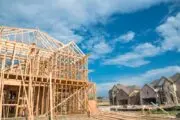Tarion is an independent consumer protection organization that administers Ontario’s new home warranty program. In late June, it released its report on new home shoppers in the province. Over 500 Ontarians were surveyed between late November and early December 2022.
Some of the notable figures include the following:
• 58 per cent of respondents prefer newly built homes for energy efficiency
• 35 per cent were born outside of Canada
• 54 per cent are millennials.
• 66 per cent are considering a fully detached home
The report offers a clear picture of Ontario’s homebuying types and their reasons for choosing a new build.
Who’s buying in Ontario?
Over one-third (35 per cent) are new homebuyers, while the remaining two-thirds are repeat purchasers. Millennials comprise the bulk of first-time homebuyers, with 46 per cent responding. Fifty-four per cent of those surveyed were single.
When it comes to the type of home, first-timers had their eyes on a condo (42 per cent) or a townhome (43 per cent).
Baby boomers represent Ontario’s repeat buyers by a whopping margin — 86 per cent.
Why do Ontarians want to buy new homes?
Besides the obvious appeal of being the first owner of a brand-new home, the Tarion report defines the other desires of potential Ontario new home buyers.
According to the survey, 84 per cent plan to use the new home as their primary residence. Nearly six in ten (58 per cent) would consider renting all or part of the home. Fifteen per cent may use it as an investment property.
Meanwhile, many respondents seek a hybrid work environment in a post-pandemic world. Almost three-quarters (72 per cent) value the possibility of working from home.
The top factors in choosing a new home include its size and space (98 per cent), price (98 per cent), the energy efficiency of the home (96 per cent) and its appliances (92 per cent), the home’s style or design (94 per cent), the builder or building company’s reputation (92 per cent), and the home’s warranty protection (91 per cent).
Sustainability and energy efficiency are critical factors in purchasing a new home versus resale.
When respondents were asked why they prefer a pre-construction or newly built home rather than a home built more than five years ago, 58 per cent claimed freshly built homes are more energy efficient. Respondents more likely to value energy efficiency are aged 45-54 (67 per cent).
Livabl spoke with Tarion CEO Peter Balasubramanian about the report’s findings.
Why did Tarion create this report?
I think one of the key elements is understanding who the customers are and their respective needs.
There’s been so much change over the past decade. Coming out of the pandemic, there are so many housing issues and so many demographic changes. I think it’s important for an organization like ours to spend some time and understand the consumer. We did not go into the survey with a preconceived notion.
What were some of the numbers that stood out to you?
We talked about window shoppers, but we broke it down into short, medium, and long-term intenders. Short-term would include those who are ready to buy right now or within the next three months (10 per cent). Medium might be pushing three to six months (29 per cent), and long-term are the people who don’t plan to enter the market until six months or later (61 per cent).
That’s helpful to be aware of and I think it’s something that we’ll want to look at over time to see how those numbers change. But I think that’s a reflection of the way the uncertainty in the housing market is impacted by people in Ontario.
I think the pressures putting most people into the “wait and see” category are connected, and there are multiple factors. One of them is uncertainty around the overall economic situation. How much is it going to cost me to get a mortgage? But also, don’t forget that many people getting ready to buy a house already own a home, or have some property, as well. So, they’re also worried about prices changing and dropping. How long are they going to have to have their house on the market?
There are two elements to this equation that will either push people to look sooner or make them more likely to wait on the sidelines. And I think that’s something that we’re going to want to look at over time.
My feeling is that if we had done this review a year ago, you might have seen a higher number choosing to wait longer, and then you’d see it change down to 60 per cent. But the overall uncertainty hasn’t changed. What’s changed is that the pressure just has a limit to how far it can build. People are being pushed into the marketplace.
Were you surprised that energy efficiency was such a dominating factor in choosing a new home (96 per cent)?
That did surprise me — I probably would have guessed that would have been a bit lower. Before I saw this data, I would have defaulted to kind of the traditional factors: Location, price, maybe reputation of the builder as being the largest drivers. I think it pops out that a significant number of new homebuyers identifying energy efficiency is one of the most important things they’re considering.
Now we also know in the research, that the largest group is comprised of Millennials. It’s not surprising that energy efficiency may be more on their minds.
But I think it is a great signal to industry that they need to focus on delivering those features. And it’s a positive thing. Right now, all you need to do is open your door and smell the wildfires to recognize that climate change is upon us.
Energy efficiency is not just connected to paying less to maintain your home. It’s also about reducing your carbon footprint and working collectively to make sure that housing fits with our overall climate strategy. That’s an important data point. And I think you’re going to start to see the building codes change. You’re starting to see designs and types of products being offered as part of the change, and I think that’s going to be great for Ontario.
It was revealing to see that 58 per cent of respondents were considering the idea of using their new home as a rental.
The first data point is that 84 per cent still want to have a traditional house. So, the vast majority people say, “Look, I just want to buy a house and I want it to be my primary residence.”
But when you ask them how do they feel about renting? You get almost 60 per cent say, “I’d like to be able to rent all or part of my house.” I think it goes back to affordability.
When you back up and consider some of the paths where the province can solve or mitigate the housing affordability issues, one avenue involves increasing supply. When we think about increasing the supply of houses, sometimes we think about building new houses. But it’s also about building different types of housing, and that includes rental housing.
So, if you build a single home but that home can rent out its basement, perhaps you’ve increased your housing supply by two or more depending on how many people can live in the rented space.
I think it correlates to the overall uncertainty and challenges around pricing. People are saying, “I may not do it. But I want to have the option if I need it.” Like energy efficiency, that’s a signal to the homebuilding industry, to be considering what kind of products they’re putting out there.
Are they going to be developing products that can have basement suites that have independent access? I also think it’s a signal to municipalities. Are you going to be willing to pass zoning bylaws that allow for rental and allow for multiple families to live with same dwelling? Those are the policy questions that arise out of that. It stands out to me that there’s a desire for that option in Ontario.
What are Tarion’s plans for collecting this type of data going forward? Is it something you’d like to continue doing?
At this point, we would plan to do this annually. Whether or not we continue to do it annually might depend on the results. If we do it next year, and we see that there’s not much of a shift, you know, then we might want to take a bit more time.
Again, it’s kind of a unique moment in our history because the pandemic made so many dynamic changes. Normally, I think housing tends to be more stable and boring, but we’re not in a very stable and a very boring time. It’s exciting and interesting.
But there’s a lot of information here that’s relevant specifically to how we deliver our consumer protection. I was surprised when I looked at this material, that just under four out of 10 people research their builder before buying. And only 14 per cent of people consult a lawyer.
Given the complexity of buying a house in today’s market, and the amount of money involved, it surprises me that someone will plan to buy an espresso machine and they’ll research it for days. But when you’re buying a house, perhaps you’re not you’re not kind of giving it the same effort.
To read the entire 2023 New Home Buyers Report from Tarion, click here.









